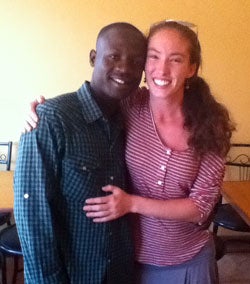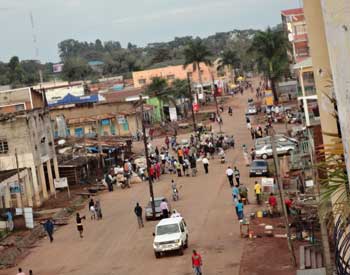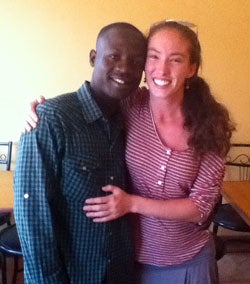 KINGSTON, R.I.- March 6, 2012 – Lily McKay, junior anthropology major from North Kingstown, came back from Uganda a little over a month ago with a new perspective on issues that the average American faces on a daily basis.
KINGSTON, R.I.- March 6, 2012 – Lily McKay, junior anthropology major from North Kingstown, came back from Uganda a little over a month ago with a new perspective on issues that the average American faces on a daily basis.
The School for International Training facilitated the four-month independent study that focused on the cultural views of children and people with disabilities.
“As soon as I was old enough to know what Africa was, I knew I wanted to study there. I became involved with Invisible Children a few years ago, which is an organization that rescues child soldiers, and through that program, learned more about Uganda and decided that was where I wanted to go,” said McKay.
McKay was able to earn 16 credits toward her major through this untraditional study abroad program that focuses on experiential learning, which means being part of the community versus going to classes.
“Although I only had to attend a few lectures, my learning in those four months went well beyond what I learned in classrooms,” recalled McKay.
While abroad, she interviewed participants in the Ugandan Special Olympics who attended schools for students with disabilities, as well as those who taught there. Due to poor funding, students with developmental disabilities are segregated and schooled separately. They rarely ever have the opportunity to be integrated into the traditional school system, according to McKay. The overall lack of financial support not only affects the education system; it affects almost every aspect of daily life. McKay lived without power for five to six weeks while abroad, and when it was working, it would only last for five hours a day.
 “We didn’t have many chances to watch TV in Uganda, so when I came back to the United States, I didn’t really feel the need to watch it anymore. Also, because I had gotten use to the lack of power, when I came home I no longer noticed if lights were on or off, or whether lighting was bad in a particular room, said McKay.
“We didn’t have many chances to watch TV in Uganda, so when I came back to the United States, I didn’t really feel the need to watch it anymore. Also, because I had gotten use to the lack of power, when I came home I no longer noticed if lights were on or off, or whether lighting was bad in a particular room, said McKay.
The unbearable heat and the fact that the only place with air conditioning in the town was a small coffee shop, where McKay and others would hang out, also contributed to the initial culture shock.
“From 11 a.m. to 4 p.m., temperatures would reach the 100s, and during the rainy season the humidity was about the same as Rhode Island in the summer. I eventually got use to the heat to a certain extent, but if I could avoid being outside during that time, I would,” recalled McKay.
Although she was there for monsoon season, it mostly only rained at night, which caused the weather to cool down about 15 degrees.
“The grass thatch huts were amazing and perfectly equipped to keep out the rain, for which we were very grateful,” recalled McKay.
When it came to plumbing, a toilet was a mere hole in the ground, while showers involved nothing more than pouring buckets of water over oneself. She said such conditions are a result of most foreign aid being intercepted by the government. The aid rarely makes it to the citizens in need, according to McKay.
“Within the first two weeks of being there, I learned the difference between first world problems and third world problems…for example, not being able to get internet versus not being able to eat for three days,” recalled McKay.
Through the interviewing process, McKay encountered many residents with powerful and disturbing stories, incomparable to any she had heard before traveling to this part of the world. One of her most rewarding, yet most difficult experiences took place when a Ugandan man named Brian eventually trusted her enough to tell her his story. At 14, he watched the Lords Resistance Army, a group known for forcing children to become soldiers and terrorizing the citizens of Northern Uganda, burn his home down while his parents were inside. Brian and his 8-year-old brother were then sent to live with their uncle, who abused and took advantage of them on a regular basis.
“His story would make anyone cry. I certainly did when I heard it. I could not understand how he was living functionally after going through all of this. He has helped me appreciate the people who are important in my life and that no matter how bad a situation can get, there is always a silver lining,” said McKay.
 McKay encountered a variety of stereotypes. According to McKay, many of the natives assume that if a person is white, they have money, and will expect them to hand it over. This stems from the fact that many white people that they encounter are there to provide foreign aid.
McKay encountered a variety of stereotypes. According to McKay, many of the natives assume that if a person is white, they have money, and will expect them to hand it over. This stems from the fact that many white people that they encounter are there to provide foreign aid.
“People would just come up to you, mostly kids between the ages of 2 and 10, and say, ‘Give me money.’ I got to know some of the shop owners and luckily they let me hide in their shops until the kids went away,” recalled McKay.
Although getting acclimated to such a different culture was difficult at times, McKay was grateful for the experience and the friends she made in her program as well as in Uganda.
“This was my first experience going abroad through a school program, and I would do it again in a heartbeat. If somebody gave me a plane ticket to go back to Uganda today, I would go. I would even live there,” said McKay.
McKay advises students interested in participating in a similar program to visit URI’s Office of International Education to explore possible options.
Victoria Antonelli, an intern in the Communications and Marketing Department, wrote this release.

